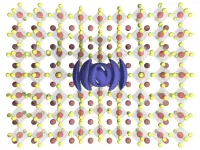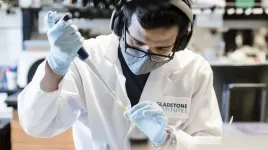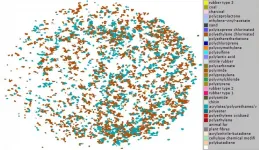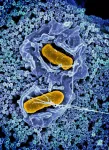Study finds ongoing evolution in Tasmanian Devils' response to transmissible cancer
U of I-led study finds ongoing evolution in Tasmanian Devils' response to transmissible cancer
2021-05-26
(Press-News.org) MOSCOW, Idaho -- May 26, 2021 -- University of Idaho researchers partnered with other scientists from the United States and Australia to study the evolution of Tasmanian devils in response to a unique transmissible cancer.
The team found that historic and ongoing evolution are widespread across the devils' genome, but there is little overlap of genes between those two timescales. These findings, published in Proceedings of the Royal Society B, suggest that if transmissible cancers occurred historically in devils, they imposed natural selection on different sets of genes.
Tasmanian devils suffer from a transmissible cancer called devil facial tumor disease (DFTD). Unlike typical cancers, tumor cells from transmissible cancers are directly transferred from one individual to another like an infectious disease. DTFD is most commonly transmitted from host to host as devils bite each other during mating season. The tumors become malignant and can kill their hosts within six months.
DFTD was first discovered in 1996, and the recent discovery of a second transmissible cancer in Tasmanian devils in 2016 suggests that they may be prone to this unique type of disease. The threat of these two cancers has prompted conservation efforts.
"For the conservation of Tasmanian devils, our work adds to the growing list of genes that we have observed to be evolving in response to DFTD," said Paul Hohenlohe, U of I Department of Biological Sciences associate professor, Institute for Bioinformatics and Evolutionary Studies (IBEST) principal investigator and senior author on the paper. "We can monitor genetic diversity of these genes in wild populations to understand whether and how these populations can adapt and survive in the face of DFTD."
Using genomic sequencing and data analysis, the research team tested for natural selection in Tasmanian devils in response to DFTD to find out whether they are evolving as a result of the disease. They also looked for evidence of natural selection in the devils' evolutionary history to test whether the genes that are evolving under DFTD show evidence of historical natural selection.
Finding little overlap in what genes are involved at historical and modern timescales, the team determined that if transmissible cancers have occurred historically in devils, they caused natural selection on different sets of genes. Their results and analysis of historical selection suggest that DFTD is a newly emerging selective force that distinctly shapes today's wild devils.
This information can be used to inform conservation efforts by identifying targets for genetic monitoring and guiding maintenance of adaptive potential in Tasmanian devil populations.
"Our work suggests that maintaining genetic diversity across a wide set of functionally important genes is critical to make sure Tasmanian devils are able to adapt to transmissible cancers and other threats to their survival," Hohenlohe said.
INFORMATION:
[Attachments] See images for this press release:
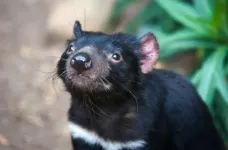
ELSE PRESS RELEASES FROM THIS DATE:
2021-05-26
Children of Latinx immigrants who take on adult responsibilities exhibit higher levels of political activity compared with those who do not, according to University of Georgia researcher Roberto Carlos.
Immigrant communities often display low levels of political engagement, but a new study by Carlos indicates that when children of Latinx immigrants take on adult roles because of parents' long work hours, immigrant status or language deficiencies, they develop noncognitive skills associated with higher rates of political participation.
"There is thriving in spaces that we wouldn't necessarily expect because of the hardship related ...
2021-05-26
"If you can't measure it, you can't improve it". This concept is also true within the context of climate policy, where the achievement of the objectives of the United Nations Framework Convention on Climate Change (UNFCCC) is dependent on the ability of the international community to accurately measure greenhouse gas (GHG) emission trends and, consequently, to alter these trends.
Greenhouse gas (GHG) emission inventories represent the link between national and international political actions on climate change, and climate and environmental sciences. Research communities and inventory agencies have approached the problem of climate ...
2021-05-26
Researchers at McGill University have gained new insight into the workings of perovskites, a semiconductor material that shows great promise for making high-efficiency, low-cost solar cells and a range of other optical and electronic devices.
Perovskites have drawn attention over the past decade because of their ability to act as semiconductors even when there are defects in the material's crystal structure. This makes perovskites special because getting most other semiconductors to work well requires stringent and costly manufacturing techniques to produce crystals that are as defect-free ...
2021-05-26
SAN FRANCISCO, CA--May 26, 2021--In January 2021, reports of a new coronavirus variant that had emerged in California raised many concerns. Preliminary data suggested that it is more transmissible than the unmutated strains of SARS-CoV-2 (the virus that causes COVID-19) from which it evolved.
Now, a multifaceted collaboration between researchers at UC San Francisco, Gladstone Institutes, and other organizations across California provides a comprehensive portrait of the variant--including its interaction with the immune system and its potential to spread.
"Our ...
2021-05-26
Even though people stayed in touch during the pandemic's stay-at-home orders and social distancing, it was easy to feel out of touch with loved ones.
Technology and the internet have expanded the way humans communicate and added much to that communication -- think emojis, GIFs and memes. But they can still fall short of being physically with someone.
"Our social cues are limited online," said Fannie Liu, a research scientist at Snap Inc who earned her Ph.D. from the Human-Computer Interaction Institute in Carnegie Mellon University's School of Computer Science. "We're exploring a new way to support digital connection through a deeper and more internal cue."
Liu was part of a team from CMU, Snap and the University ...
2021-05-26
A new study looking across a large body of research finds further evidence for the safety of vaccines that are Food and Drug Administration-approved and routinely recommended for children, adults and pregnant women. The study updates a vaccine safety review that was released by the federal Agency for Healthcare Research and Quality in 2014.
"This in-depth analysis found no evidence of increased risk of serious adverse events following vaccines, apart from a few - previously known - associations," said Susanne Hempel, director of the Southern California Evidence Review Center.
The meta-analysis, ...
2021-05-26
In cities, heavy rains wash away the gunk collecting on sidewalks and roads, picking up all kinds of debris. However, the amount of microplastic pollution swept away by this runoff is currently unknown. Now, researchers in ACS ES&T Water report that stormwater can be a large source of microplastics and rubber fragments to water bodies and, with a proof-of-concept experiment, show that a rain garden could keep these microscopic pieces out of a storm drain.
Most cities' storm drains end up discharging directly into wetlands, creeks or rivers. Rainwater running into these drains becomes a concoction of whatever is on the ground, including dirt and grass clippings, leaked car fluids, fertilizer and garbage. Recently, researchers also found that ...
2021-05-26
Scientists have got up close and personal with human sewage to determine how best to measure hidden and potentially dangerous plastics.
As the way microplastics are measured and counted varies from place to place, there is no agreed understanding of the weight of the problem. Until scientists can agree on one way of measuring them, life on land and sea will continue to ingest who knows how much plastic, affecting health for generations.
A new study, published today in Analytical and Bioanalytical Chemistry, by the University of Portsmouth has examined one method, using a chemical solution called 'Fenton reagent' to ...
2021-05-26
WHAT:
The immune system's attempt to eliminate Salmonella bacteria from the gastrointestinal (GI) tract instead facilitates colonization of the intestinal tract and fecal shedding, according to National Institutes of Health scientists. The study, published in Cell Host & Microbe, was conducted by National Institute of Allergy and Infectious Diseases (NIAID) scientists at Rocky Mountain Laboratories in Hamilton, Montana.
Salmonella Typhimurium bacteria (hereafter Salmonella) live in the gut and often cause gastroenteritis in people. The Centers for Disease Control and Prevention estimates Salmonella bacteria cause about ...
2021-05-26
The COVID-19 pandemic has seen scientists perform incredible feats in a short amount of time, from developing tests to new types of vaccines. Despite these victories, experts are still working to develop an effective antiviral drug to kill the SARS-CoV-2 virus. A cover story in Chemical & Engineering News, the weekly newsmagazine of the American Chemical Society, details the challenges of and progress toward creating a drug that would help the world conquer COVID-19.
Creating a new antiviral drug is a tricky business. Viruses mutate and replicate quickly, and their structures differ greatly even within the same class, ...
LAST 30 PRESS RELEASES:
[Press-News.org] Study finds ongoing evolution in Tasmanian Devils' response to transmissible cancer
U of I-led study finds ongoing evolution in Tasmanian Devils' response to transmissible cancer

